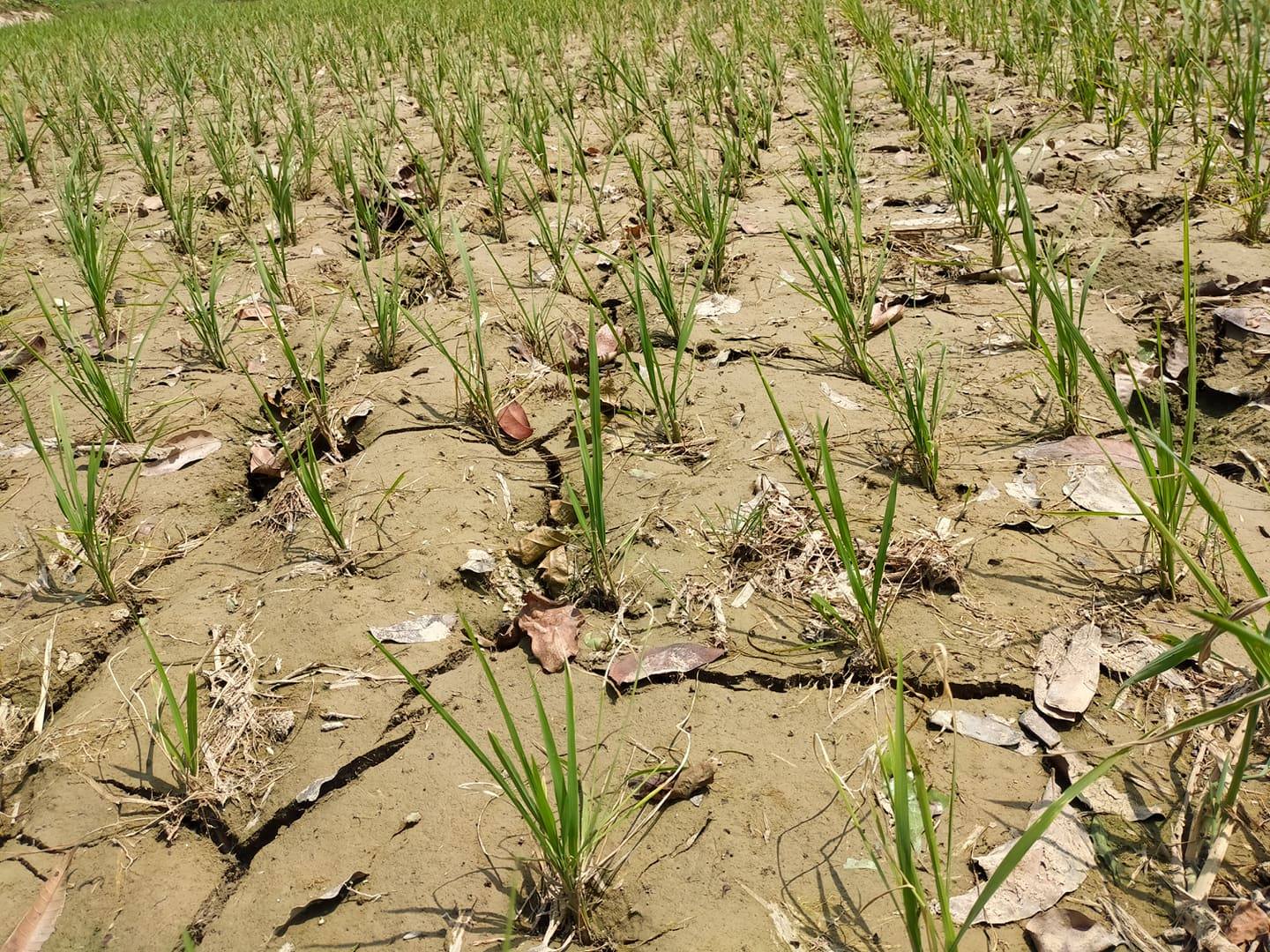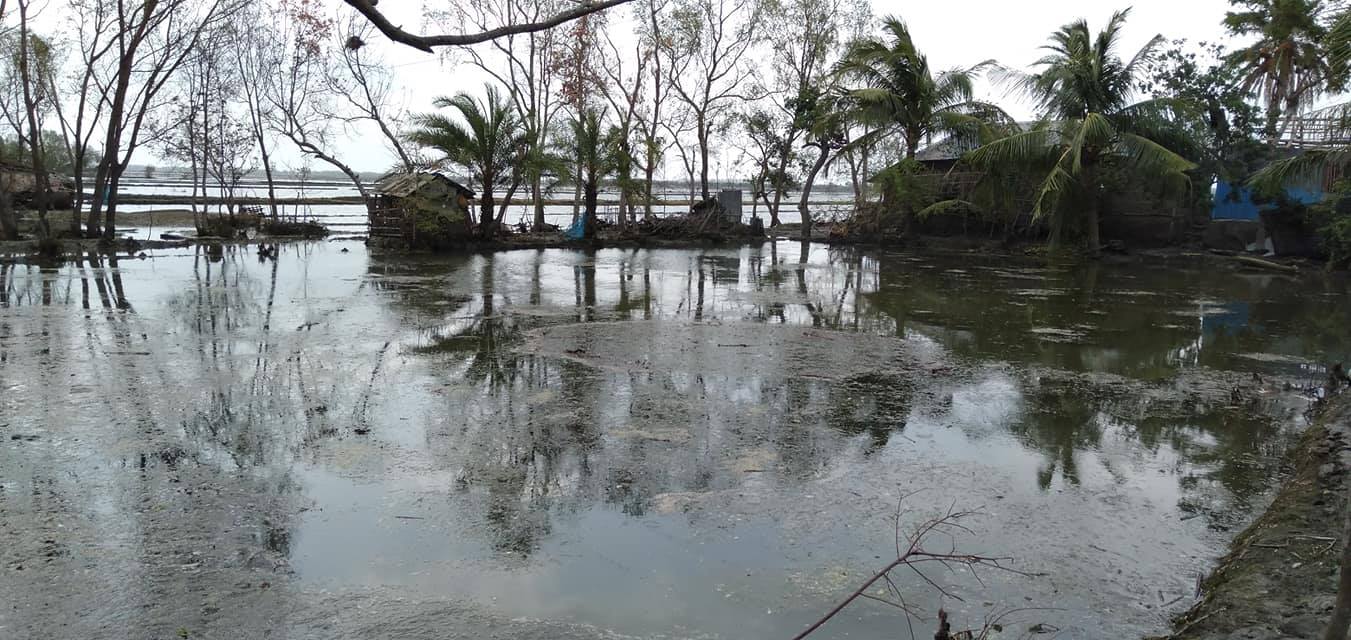BM Touhidul Alam
Bangladesh: general context and geographic settings
With a population of about 160 million living in an area covering 144,000 km², Bangladesh is one of the most densely populated countries in the world. More than 75 per cent of its people live in rural areas and agriculture represented 14.23 per cent of the country’s GDP in 2019. With another 33 percent of GDP is derived from the rural non-farm economy, which is also linked to agriculture where employed 60 percent of total labor force and around 54 percent of rural population is employed in agriculture (World Bank). Therefore, agriculture in Bangladesh is considered the key element of the economies like most of the SAARC countries till today. Despite GDP declines, agriculture plays formidable role in employment in rural areas, providing food and nutrition and supplying raw materials for industries.
Located between the Himalayan Mountains and the Bay of Bengal, Bangladesh is highly vulnerable to climate change and its impacts. Ice and snow melting from the mountain tops often combine with rainfalls and draining water from neighboring countries to swell the numerous rivers of Bangladesh, causing floods that sometimes last for several months. 30% of the cultivable lands in the coastal areas are affected by salinity. Intrusion of saline water is an acute problem in coastal Bangladesh. People of coastal areas are most affected; particularly south-west region and seasonal droughts in the north-western region of Bangladesh are also intensifying. Such hazards have a significant effect on agricultural production, livestock population, employment and health. The performance of agricultural sector has an overwhelming impact on major macroeconomic objectives like employment generation, poverty alleviation, human resource development and food security. But agriculture is under threat due to adverse climate change impact. Under such circumstances, the food security is seriously undermined by worsening climate conditions.
Climate change: changing life, livelihood and lifestyle
Climate change now is the biggest global threat to humanity in the 21st century. Bangladesh is one of the most vulnerable countries in the world facing the potential impacts of climate change. According to the Global Climate Risk Index 2009, Bangladesh is the most vulnerable nation to extreme weather events of climate change. Although, there are so many controversies about the scale of climate change impact. The Intergovernmental Panel on Climate Change (IPCC) impacts assessments recognized Bangladesh as one of the most susceptible to the negative impacts of climate change. Due to geographic location, Bangladesh is one of the most disaster prone countries in the world, therefore, climate change threatening lives and livelihoods across the country to a great extent.
Adverse impact of climate change has been poising a serious threat to livelihood. Like many other parts, climate change is also changing the lifestyle and increasing hardship in rural areas in Bangladesh. Communities in some areas face the regular threat of destructive climatic events. Poor and vulnerable people are particularly affected by climate change impacts. Extreme weather events, like storm surge, cyclone, salinity, floods, droughts etc. have been affecting peoples’ life and livelihoods. The devastation caused by severe flooding leaves families destitute. It destroys homes, cultivated land, stored food, livestock and even human life. The food shortages increase further threat, along with the disease ridden stagnant waters that shroud the area. On the other hand, long periods without rainfall can devastate families who are dependent on agriculture for their food as well as their income. As climate change makes weather patterns unpredictable, it is the farmers who are suffering the worst.
In coastal belt, climate change, manifesting in the form of intensified cyclones, storm surges, and sea-level rise, is accelerating salt water intrusion into the fresh water resources. Climate change-induced soil and water salinity has been adversely impacted freshwater dependent agricultural livelihoods (leading to loss of productivity or livelihoods) as well as the availability and quality of drinking water in the vulnerable coastal communities. Furthermore, given the crucial role that women play in water security and household level resilience, and their socio-economic marginalization, the climate change-induced threat to agricultural livelihoods and drinking water security of the affected coastal communities disproportionately affects women and women and girls.
As agriculture is the livelihoods of many people that depend on climate regime and any significant change can have far reaching impacts on the overall socio-economic system. However, role of Bangladesh is very limited in climate change. Nevertheless, she will have to suffer and face the tremendous impact. In Bangladesh, there is no doubt that, climate change vulnerabilities are affecting badly in agriculture, life and livelihood. Since farming is already under pressure for several reasons like scarcity of land, demand of technology etc. therefore, the present task is to explore the possible alternatives of agriculture to ensure and secure the production and livelihood. It is obvious; there is no panacea to overcome the problems. Thus, it will be wise for us to adapt ourselves with the changing environment with our limited resources.
Food security remains big challenge and in under threat
Food remains at the top of the basic needs for human being. Despite remarkable success and progress of civilization, science and technology, it is yet not possible to ensure adequate food for all people on the planet. In Bangladesh, although food grain production has tripled over the last 40 years, the production of other major food crops, such as pulses, oilseeds, fruits, vegetables, fish, milk, meat and eggs, which are essential for a diversified and balanced diet, still remains far below the actual requirements. Coupled with the severe levels of malnutrition, 17percent of the population (over 25 million people) survives on less than the minimum 2,122 kcal/person/day. Although access to food has improved, 40 percent of the population still lives below the national poverty line, of which 25 percent suffer from severe poverty. Statistics also demonstrates that 25 percent of the nation’s population has limited availability, access to and consumption of adequate quantities of nutritious food year round. The importance of dietary diversity is therefore significant. The situation is rendered even more complicated by the fact that climate change poses a major challenge to Bangladesh’s food security. Moreover, improves agricultural technologies and natural resource management are essential to achieve food security and improved nutrition, and promote sustainable agriculture for the poor is also a big challenge as well and research shows that climate change will have a massive impact on food production and may jeopardize food security in many regions.
Agriculture is always vulnerable to unfavorable weather events and climatic conditions. Despite technological advancement such as improved crop varieties, expanded irrigation facilities- weather and climate are still key factors in agricultural productivity. It is estimated that temperatures will increase faster that will lead extreme climatic events such as heavier rainfall, cyclones and heat waves in those frequent days to come. It is evident that climate change effects have not only affected agriculture but also it affected the food security, biodiversity, water in coastal resources, and human health. However, in recent years, the frequency of extreme climatic events, such as floods and cyclones has increased worldwide. This is causing havoc to many vulnerable countries and communities particularly in the Least Developed Countries. As Bangladesh is most vulnerable to disasters due to the frequency of extreme climate events, the entire harvest can be wiped out in a matter of hours when disaster hit the country.
The impacts of climate change on agricultural food production are global concerns, and they are very important for Bangladesh. Agriculture in Bangladesh is already under pressure both from huge and increasing demands for food, shortage of agricultural land and water resources depletion. The consequences of global climate change make the issue particularly urgent. In last two decades, an ever-increasing frequency of flood, droughts, salinity, pest and disease intensity, ground water level depletion and variable precipitation is likely being serious problems in agriculture which causes extensive economic damage and impairing livelihood of farmers. Researchers have found that at least one-quarter of the world’s wheat production will be lost to extreme weather from climate change in the coming decades if no adaptation measures are taken. The crop model indicates that in South Asia, average yields in 2050 for crops will decline from 2000 levels by about 50% for wheat, 17% for rice and about 6% for maize because of climate change. Most alarming is that, Bangladesh is one of the most vulnerable countries to climate change in South Asi
Looking forward to…
Agriculture still has been serving as an important engine for economic growth in Bangladesh. As it has deep rooted with our culture and tradition therefore, it is inseparable from rural life. Yet average yields have lagged far behind those in developed countries for decades and the situation is rendered even more complicated by the fact that climate change poses a major challenge to Bangladesh’s agriculture as well as food security.
Bangladesh has recognized climate change as an important issue in food production and attempts are being made to incorporate potential response measures for reducing impacts of climate change into overall development planning process. The issue has also been recognized at the higher political level of the country. Bangladesh has emphasized in research and developed a variety of coping mechanisms at formal and informal levels which has greatly reduced loss of life, crops and property. Still it is important to devise viable strategies and pro-poor policy approaches by integrating climate change, food security and agriculture for reducing climate change vulnerability.
Bangladesh has been in the frontline in fighting against climate change. The local communities have resilience in adapting to the changes, but they need greater adaptive capacity to address emerging and future risks and vulnerability to rapid climate change. Community people need further awareness, right information, new knowledge, resources and technical as well as policy and institutional supports to fight against global climate change which has severe local impacts affecting the food security, lives and livelihood of the common people particularly in the developing countries. It is obvious that good policy should be based on good science and local knowledge which may lead to successful community actions towards climate change risk reduction.


